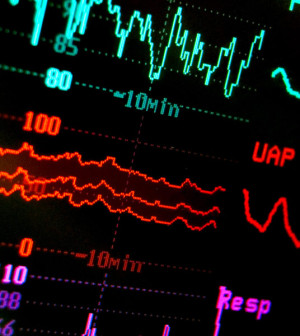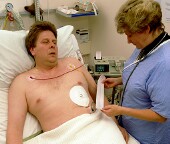- 8 Ways to Increase Dopamine Naturally
- 7 Best Breads for Maintaining Stable Blood Sugar
- Gelatin vs. Collagen: Which is Best for Skin, Nails, and Joints?
- The Long-Term Effects of Daily Turmeric Supplements on Liver Health
- Could Your Grocery Store Meat Be Causing Recurring UTIs?
- Are You Making This Expensive Thermostat Error This Winter?
- Recognizing the Signs of Hypothyroidism
- 10 Strategies to Overcome Insomnia
- Could Artificial Sweeteners Be Aging the Brain Faster?
- Techniques for Soothing Your Nervous System
Heart-Rhythm Disorder Tied to Higher Risk of Heart Attack: Study


MONDAY, Nov. 4People with a heart-rhythm disorder called atrial fibrillation have a nearly two-fold increased risk of heart attack, and the risk is especially high in women and blacks, a new study finds.
About 3 million people in the United States have atrial fibrillation, a number expected to double in the next couple decades, said study lead author Dr. Elsayed Soliman, director of the Epidemiological Cardiology Research Center at the Wake Forest Baptist Medical Center in Winston-Salem, N.C.
Heart attack is a known risk factor for atrial fibrillation, but it wasn’t clear if the reverse was true. In order to answer that question, researchers looked at data from nearly 24,000 people, more than 1,600 of whom had atrial fibrillation.
There were about 650 heart attacks among all the study participants over seven years. The heart attack rate was nearly two times higher among people with atrial fibrillation than among those without the heart-rhythm disorder.
The results suggest a “bidirectional relationship” between heart attack and atrial fibrillation. That means that one can lead to the other, said the authors of the study, which was published online Nov. 4 in the journal JAMA Internal Medicine.
“[Atrial fibrillation] is a disease of aging and it is common, costly and has lots of complications,” Soliman said in a medical center news release. “Our study showed that patients with [atrial fibrillation] — especially women and African-Americans — are at an increased risk of heart attack compared to those without [atrial fibrillation].”
The findings add to the growing concerns of the seriousness of atrial fibrillation as a public-health burden, the researchers said.
The study found an association between atrial fibrillation and increased risk of heart attack, but it didn’t prove cause-and-effect.
More information
The U.S. National Heart, Lung, and Blood Institute has more about atrial fibrillation.
Source: HealthDay
Copyright © 2026 HealthDay. All rights reserved.










